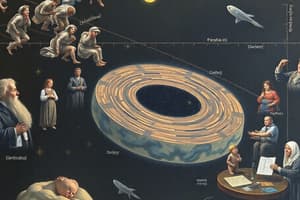Podcast
Questions and Answers
Which of the following scientific breakthroughs was not mentioned in the content as having occurred during the Scientific Revolution?
Which of the following scientific breakthroughs was not mentioned in the content as having occurred during the Scientific Revolution?
- The invention of the telescope.
- The development of the first vaccine.
- The discovery of the laws of motion.
- The invention of the printing press. (correct)
What was Newton's main contribution to science?
What was Newton's main contribution to science?
- He discovered the laws of motion and gravity. (correct)
- He discovered the existence of the atom.
- He invented the first telescope.
- He developed the theory of relativity.
What does the content suggest about Newton's approach to understanding nature?
What does the content suggest about Newton's approach to understanding nature?
- Newton argued that nature operates according to fixed laws. (correct)
- Newton believed that nature is inherently unpredictable.
- Newton thought that nature is best understood through observation alone.
- Newton believed that nature is governed by random events.
Which of the following scientific discoveries is directly attributed to Isaac Newton?
Which of the following scientific discoveries is directly attributed to Isaac Newton?
What was Newton's inspiration for developing his theory of gravity?
What was Newton's inspiration for developing his theory of gravity?
Which of the following best describes Galileo Galilei's contribution to astronomy?
Which of the following best describes Galileo Galilei's contribution to astronomy?
What was the primary reason for Galileo Galilei's arrest and house arrest in 1633?
What was the primary reason for Galileo Galilei's arrest and house arrest in 1633?
Which of these individuals emphasized the use of experimentation and observation as the primary methods for understanding the world?
Which of these individuals emphasized the use of experimentation and observation as the primary methods for understanding the world?
Descartes' famous saying, 'I think, therefore I am', is most closely related to which of the following concepts?
Descartes' famous saying, 'I think, therefore I am', is most closely related to which of the following concepts?
Which of the following best describes the Scientific Method?
Which of the following best describes the Scientific Method?
What was Tycho Brahe's primary contribution to the advancement of astronomy?
What was Tycho Brahe's primary contribution to the advancement of astronomy?
Which of the following is NOT a key feature of Kepler's Laws of Planetary Motion?
Which of the following is NOT a key feature of Kepler's Laws of Planetary Motion?
How did Isaac Newton's work build upon the contributions of earlier scientists like Brahe and Kepler?
How did Isaac Newton's work build upon the contributions of earlier scientists like Brahe and Kepler?
Why was Copernicus's theory of the heliocentric universe not entirely accurate?
Why was Copernicus's theory of the heliocentric universe not entirely accurate?
What was the primary method of determining truth prior to the Scientific Revolution?
What was the primary method of determining truth prior to the Scientific Revolution?
Which of these key principles is NOT essential to the Scientific Revolution?
Which of these key principles is NOT essential to the Scientific Revolution?
What was the major intellectual transformation that emerged from the Scientific Revolution?
What was the major intellectual transformation that emerged from the Scientific Revolution?
How did the Scientific Revolution contribute to the rise of the Enlightenment?
How did the Scientific Revolution contribute to the rise of the Enlightenment?
What was the geocentric theory?
What was the geocentric theory?
Why was it significant that Copernicus published his findings?
Why was it significant that Copernicus published his findings?
What is the significance of the Scientific Revolution for the modern world?
What is the significance of the Scientific Revolution for the modern world?
Flashcards
Scientific Revolution
Scientific Revolution
A significant transformation in scientific thought during the 17th and 18th centuries that led to modern science.
Geocentric Theory
Geocentric Theory
The belief that the Earth is at the center of the universe.
Heliocentric Theory
Heliocentric Theory
The model suggesting the sun is at the center of the universe, proposed by Copernicus.
Principles of the Scientific Revolution
Principles of the Scientific Revolution
Signup and view all the flashcards
Enlightenment
Enlightenment
Signup and view all the flashcards
Nicolaus Copernicus
Nicolaus Copernicus
Signup and view all the flashcards
Evidence in Science
Evidence in Science
Signup and view all the flashcards
Shift in Truth Determination
Shift in Truth Determination
Signup and view all the flashcards
Galileo Galilei
Galileo Galilei
Signup and view all the flashcards
Galileo's Arrest
Galileo's Arrest
Signup and view all the flashcards
The Scientific Method
The Scientific Method
Signup and view all the flashcards
Francis Bacon
Francis Bacon
Signup and view all the flashcards
René Descartes
René Descartes
Signup and view all the flashcards
Tycho Brahe
Tycho Brahe
Signup and view all the flashcards
Johannes Kepler
Johannes Kepler
Signup and view all the flashcards
Isaac Newton
Isaac Newton
Signup and view all the flashcards
Gravity
Gravity
Signup and view all the flashcards
Laws of Motion
Laws of Motion
Signup and view all the flashcards
Calculus
Calculus
Signup and view all the flashcards
Scientific Breakthroughs
Scientific Breakthroughs
Signup and view all the flashcards
Study Notes
The Scientific Revolution
- The Scientific Revolution was a period of intellectual transformation that led to the modern world.
- By the end of the revolution, Europe was poised to enter the Enlightenment, a cultural movement that questioned traditional beliefs.
- Prior to the Scientific Revolution, scholars relied on religious interpretations and ancient Greek/Roman thinkers to determine truth.
- The common view was a geocentric model, with Earth at the center of the universe.
Principles of the Scientific Revolution
- Logic superseded faith as the primary mode of understanding.
- Scientific questioning emerged from discrepancies between observation and expectations.
- Verification relied on mathematical proofs and experiments.
- Observation, experimentation, and publication were crucial components of the process.
Key Figures
- Copernicus: Proposed a heliocentric model of the universe (sun-centered), outlined in "On the Revolutions of Heavenly Spheres".
- Galileo: Built his own telescope, observing the sun, moon, and planets. Published his findings, which challenged the prevailing geocentric model and the Church's teachings. Faced persecution for his views, though later vindicated.
- Newton: Synthesized the work of Copernicus and Galileo, developing the laws of motion and universal gravitation. This work explained planetary movement and impacted other scientific fields. Developed calculus, a mathematical tool for analyzing motion. Published his discoveries in books like the one on the laws of light and color.
- Brahe and Kepler: Brahe meticulously charted astronomical observations. Kepler used Brahe's data to formulate the Laws of Planetary Motion.
How Truth Was Determined Before the Revolution
- Scholars primarily relied on religious texts and the writings of Greek and Roman thinkers.
- Geocentric theory, placing Earth at the center of the universe, was broadly accepted.
- Christians adhered to the idea that God positioned the Earth in the universe.
What Happened to Galileo?
- In 1633, he was tried by the Inquisition and placed under house arrest for his scientific findings.
- Under threat of torture, he publicly recanted his views.
- In 1992, the Catholic Church formally acknowledged Galileo's findings were correct.
Other Scientific Breakthroughs
- Microscope (Janssen)
- Barometer (Torricelli)
- Thermometer (Fahrenheit and Celsius)
- Anatomy (Vesalius)
- Smallpox Vaccine (Jenner)
- Chemistry (Boyle)
Bacon and Descartes
- Bacon: Emphasized experimentation and observation as vital to understanding the natural world.
- Descartes: Argued that reason and logical thought were paramount, concluding that "I think therefore I am".
The Scientific Method
- The scientific method is a systematic process for scientific discovery.
- Crucial steps include observation, formulating hypotheses, experimenting to test hypotheses, and drawing conclusions.
- Data collection, sharing, and analysis are vital stages.
Other Important Figures
- Brahe and Kepler made significant contributions to the development of the understanding of the solar system and planetary orbits. Kepler formulated the laws of planetary motion based on Brahe's accurate observations, helping to confirm and advance heliocentric astronomy.
Studying That Suits You
Use AI to generate personalized quizzes and flashcards to suit your learning preferences.




